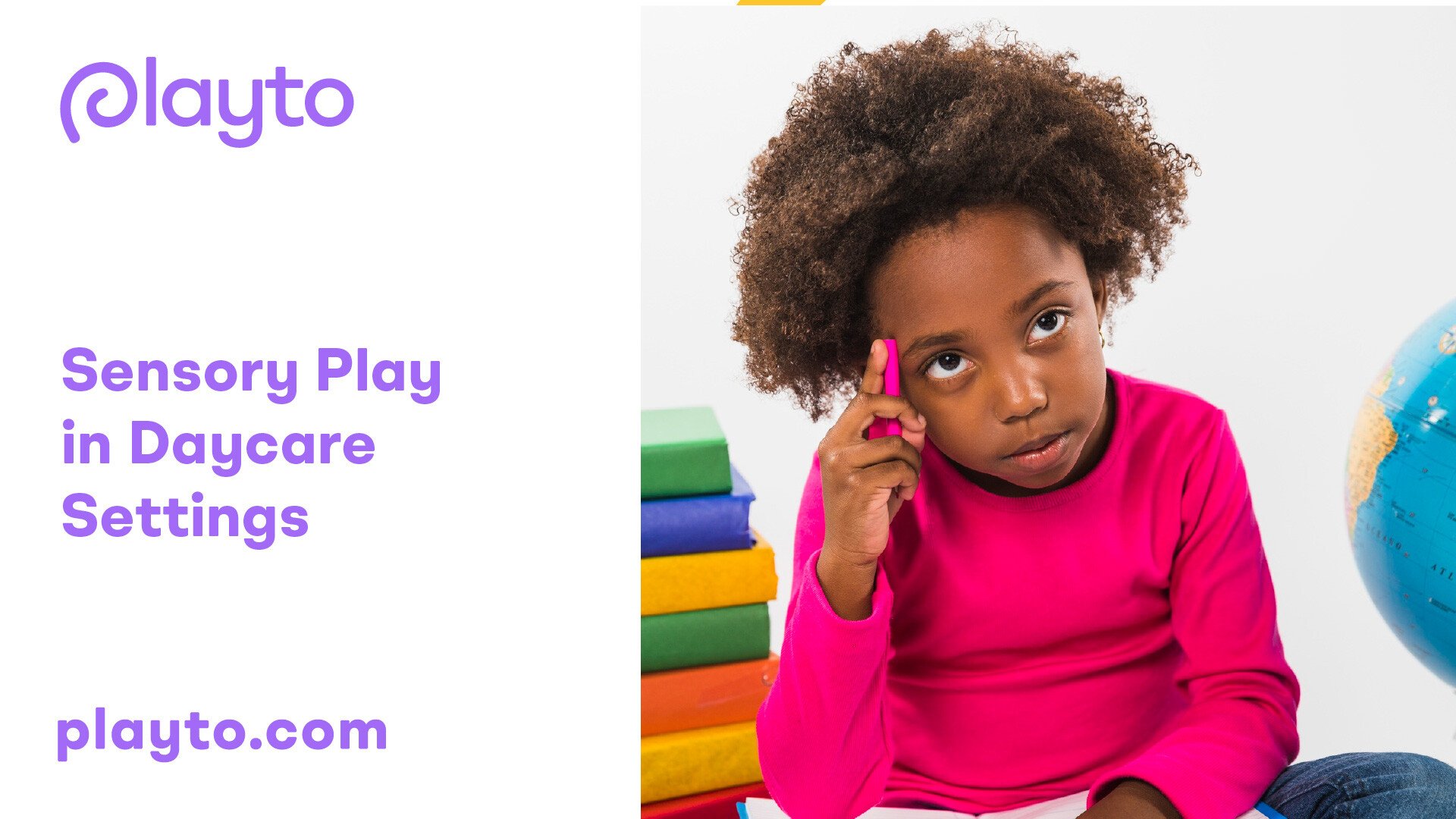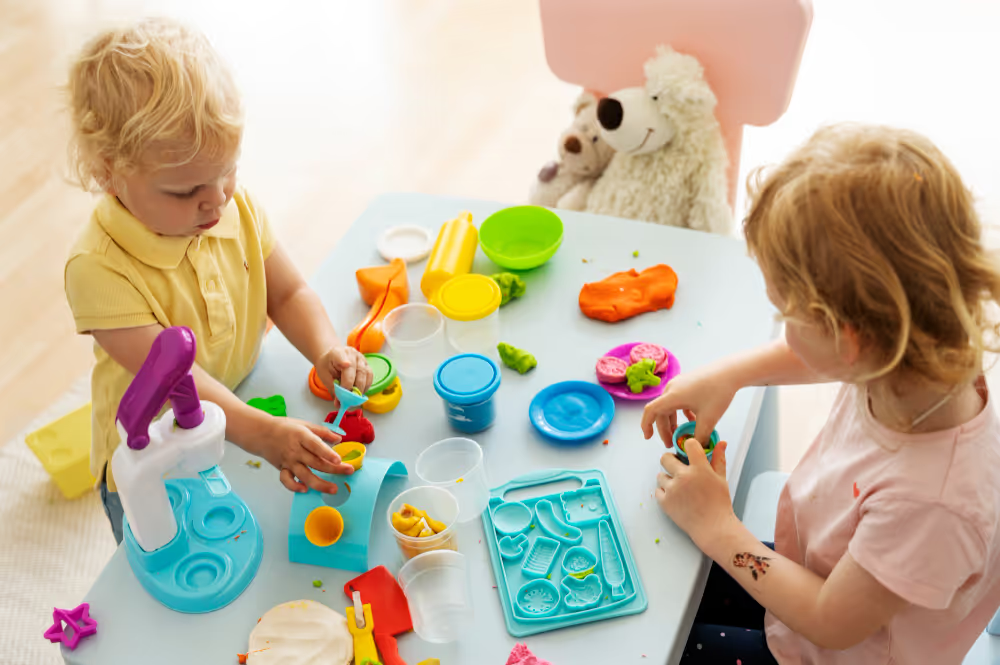Importance of Sensory Play in Daycare
Sensory play holds immense importance in daycare settings, as it offers numerous benefits and enhances developmental skills in young children. By engaging in sensory play activities, children can explore their senses and interact with the world around them, promoting holistic growth and learning.

Benefits of Sensory Play
Sensory play provides a wide range of benefits for children in daycare. According to HiMama, sensory play establishes a foundation for preschoolers to work towards more complex tasks, strengthens language development, improves problem-solving skills, and supports cognitive growth. It encourages children to explore new tastes, smells, and textures, helping them discover new ways to describe objects and food items in the world around them, enhancing their sensory experiences.
Additional benefits of sensory play include:
- Physical Development: Sensory play activities often involve touching, pouring, pinching, sorting, and moving actions, helping preschoolers build fine motor skills that will be used for tasks like writing, buttoning clothes, zipping jackets, and tying shoes [1].
- Cognitive Growth: Sensory play helps in brain development by storing information in sensory memory, progressing into short-term memory, and finally into long-term memory. It strengthens sensory-related synapses and functions, vital for sensory processing capabilities.
- Social and Emotional Development: Sensory play encourages children to participate in cooperative play, take turns, and share materials, fostering social interaction and cooperation. It also supports emotional regulation by providing a calming and soothing effect on children, helping them manage their emotions.
Developmental Skills Enhanced
Engaging in sensory play activities enhances various developmental skills in children attending daycare. Some of these skills include:
- Fine Motor Skill Development: Through sensory play, children have the opportunity to practice and refine their fine motor skills, such as grasping, pouring, and manipulating objects. These skills are essential for tasks that require hand-eye coordination and precise movements.
- Gross Motor Skill Enhancement: Certain sensory play activities, such as playing with large sensory bins or engaging in outdoor play, promote the development of gross motor skills. These skills involve larger muscle groups and help children with activities like running, jumping, and balancing.
By incorporating sensory play in daycare settings, caregivers and educators can create a stimulating and enriching environment that supports the overall development of children. The benefits of sensory play extend beyond the immediate experience, helping children build essential skills that will benefit them in various aspects of their lives. To learn more about creating a sensory-rich daycare environment, check out our article on the importance of routine in daycare.
Types of Sensory Play Activities

Sensory play activities play a vital role in daycare settings. They provide children with opportunities to engage their senses, explore their environment, and develop various skills. Here, we will explore three types of sensory play activities commonly incorporated in daycare settings: touch and texture exploration, taste and smell sensory activities, and sound and sight engagements.
Touch and Texture Exploration
One of the key aspects of sensory play is touch and texture exploration. This type of activity allows children to experience different tactile sensations, fostering their sensory development and fine motor skills. Examples of touch and texture exploration activities in daycare settings include:
- Matching fabric squares with different textures.
- Sorting objects based on their textures, such as sorting creatures by fur, feathers, or scales.
- Engaging in gross motor movements that involve stretching, yoga, or other activities that promote physical movement and balance.
These activities help children build their fine motor skills, which are essential for tasks like writing, buttoning clothes, zipping jackets, and tying shoes.
Taste and Smell Sensory Activities
Sensory play also includes activities that involve taste and smell. Through these activities, children can explore new flavors, smells, and textures, expanding their sensory experiences and vocabulary. Taste and smell sensory activities in daycare settings can include:
- Exploring different types of food and describing their tastes and smells.
- Engaging in cooking or baking activities that allow children to experience various aromas and flavors.
- Creating sensory bins with scented materials, such as herbs, spices, or flowers.
These activities encourage children to discover new ways to describe objects and food items in the world around them, enhancing their sensory experiences. It's important to ensure that any food-related sensory activities take into consideration dietary restrictions and allergies. For snack ideas suitable for daycare settings, check out our article on daycare snack ideas for picky eaters.
Sound and Sight Engagements
Sensory play activities also include engaging children's senses of sound and sight. These activities stimulate their auditory and visual senses, promoting cognitive and sensory development. Examples of sound and sight engagements in daycare settings can include:
- Providing musical instruments for children to explore different sounds and rhythms.
- Creating sensory bottles filled with colorful liquids, glitter, or small objects that children can shake and observe.
- Setting up a sensory table with different materials, such as sand, water, or rice, along with various tools for scooping, pouring, and manipulating.
These activities foster children's cognitive growth, as they encourage observation, exploration, and problem-solving skills. To learn more about developing social skills in daycare settings, visit our article on developing social skills in daycare.
By incorporating touch and texture exploration, taste and smell sensory activities, and sound and sight engagements in daycare settings, educators provide children with a rich sensory experience that promotes their overall development. These activities encourage children to actively engage with their environment, fostering their cognitive, social, emotional, and physical growth. To learn more about designing a stimulating sensory-rich environment in daycare settings, read our article on creating a sensory-rich daycare environment.
Impact on Physical Development
Sensory play in daycare settings has a significant impact on the physical development of children, helping them refine their fine motor skills and enhance their gross motor skills.
Fine Motor Skill Development
Engaging in sensory play activities allows preschoolers to develop their fine motor skills, which involve the precise use of small muscles in the hands and fingers. These skills are essential for tasks such as writing, buttoning clothes, zipping jackets, and tying shoes [1].
Through sensory play, children practice various actions such as touching, pouring, pinching, sorting, and moving objects, which require precise hand-eye coordination and manipulation. These activities help strengthen the muscles in their hands and fingers, enabling them to perform intricate tasks with dexterity.
Gross Motor Skill Enhancement
Sensory play activities also contribute to the enhancement of gross motor skills, which involve the use of larger muscle groups for movements like jumping, walking, and riding a bike.
During sensory play, children are encouraged to engage in physical movements such as crawling, climbing, and balancing. These activities help children develop their coordination, balance, and spatial awareness. By participating in sensory-based gross motor activities, children strengthen the muscles necessary for various physical activities and refine their overall physical coordination.
By incorporating sensory play into daycare settings, children have the opportunity to actively develop both their fine motor and gross motor skills. These skills are essential for their physical growth and enable them to engage in a wide range of activities with confidence and competence.
In the next sections, we will explore how sensory play also influences cognitive growth and social-emotional development. Stay tuned to discover the holistic benefits of sensory play in daycare settings.
Influence on Cognitive Growth

Sensory play in daycare settings plays a significant role in the cognitive growth of children. It contributes to brain development, enhances problem-solving skills, and fosters overall cognitive abilities. Let's explore the specific ways in which sensory play influences cognitive growth.
Brain Development through Sensory Play
Research has shown that sensory play helps build pathways between nerves in the brain, which is crucial for strengthening language development, improving problem-solving skills, and supporting cognitive growth in preschoolers. Engaging in sensory experiences stimulates various senses, such as touch, sight, smell, taste, and sound, which in turn activate different areas of the brain, leading to the formation of new neural connections.
Through sensory play, children's brains are exposed to a range of stimuli, allowing them to process and store information effectively. This process involves sensory memory, which progresses into short-term memory and eventually into long-term memory. By strengthening sensory-related synapses and functions, sensory play enhances sensory processing capabilities, enabling children to make sense of the world around them.
Problem-Solving Skills Nurtured
Engaging in sensory play activities helps children develop problem-solving skills. By encouraging exploration, discovery, and creative thinking, sensory play provides opportunities for children to encounter and overcome challenges. Through hands-on experiences, they learn how to navigate and solve problems encountered during play activities.
For example, playing with blocks or puzzles during sensory play allows children to exercise their brains, fostering exploration and discovery skills essential for future academic success. As they manipulate objects and experiment with different materials, children learn cause-and-effect relationships, spatial awareness, and critical thinking skills. This helps them develop problem-solving strategies and adapt to new situations, both inside and outside the daycare setting.
Incorporating a variety of sensory play activities into the daycare curriculum provides children with the opportunity to engage their minds, boost cognitive abilities, and develop essential problem-solving skills. By creating an environment that encourages exploration and discovery, daycare providers can support children's cognitive growth and set a solid foundation for future learning.
To explore other aspects of sensory play in daycare settings, check out our sections on the importance of sensory play, the types of sensory play activities, and the impact on physical and social-emotional development. For more tips on daycare management, check out our articles on daycare snack ideas for picky eaters, developing social skills in daycare, handling behavioral issues in daycare, and the importance of routine in daycare.
Social and Emotional Development
Sensory play in daycare settings not only provides enjoyable experiences for children but also plays a significant role in their social and emotional development. Here, we will explore two key aspects: encouraging social interaction and supporting emotional regulation.
Encouraging Social Interaction
Sensory play fosters social interaction as children engage with siblings or peers, developing communication skills, problem-solving abilities, and adaptability to different play styles. It provides opportunities for children to interact with others in new and exciting ways, inspiring communication and the sharing of experiences. This inclusive and interactive play environment is beneficial for the development of social skills.
By participating in sensory play activities together, children learn to adapt to others' play styles, take turns, and negotiate shared spaces and resources. They acquire important social skills, such as cooperation, empathy, and respect for others. Through sensory play, children build the foundation for positive social interactions, which will benefit them as they grow and navigate social relationships.
Supporting Emotional Regulation
In addition to encouraging social interaction, sensory play also supports emotional regulation in children. Sensory experiences can help children regulate their overall arousal level, assisting in calming down or stimulating those who may be sluggish. For children with hyperactivity or attention issues, sensory play can provide a beneficial outlet for their energy and help them focus.
Sensory play offers children a unique opportunity to engage with the world in ways that help them feel settled within their own bodies. It can promote self-awareness and allow children to explore and understand their own emotions. By engaging in sensory play, children can develop self-regulatory behaviors and learn to manage their emotions effectively. This, in turn, contributes to their overall emotional well-being and resilience [6].
By creating a sensory-rich environment in daycare settings, caregivers can provide children with a supportive and stimulating space for their social and emotional development. Incorporating sensory play activities into the daily routine can help children develop important skills and promote healthy social interactions. For more information on creating a sensory-rich daycare environment, refer to our article on creating a sensory-rich daycare environment.
In conclusion, sensory play in daycare settings plays a vital role in promoting social and emotional development. Encouraging social interaction through sensory play activities helps children build essential social skills, while the sensory experiences themselves support emotional regulation and self-awareness. By incorporating sensory play into daycare routines, caregivers can create a nurturing environment that fosters healthy social and emotional growth in children.
Creating a Sensory-Rich Daycare Environment
To provide an enriching and stimulating experience for children in daycare, it is essential to create a sensory-rich environment that supports their learning and development. By designing a stimulating environment and implementing inclusive practices, daycare centers can create an engaging space for all children.
Designing a Stimulating Environment
Designing a stimulating environment in daycare settings involves incorporating elements that engage the senses and promote exploration and discovery. Here are some key considerations:
- Sensory Stations: Set up various sensory stations throughout the daycare space, each focusing on different sensory experiences. For example, create a touch and texture station with materials like sand, water, or playdough, and a sound and sight station with musical instruments or visual displays.
- Colors and Visuals: Use vibrant colors and visually appealing displays to create a visually stimulating environment. Consider using educational posters, artwork, and interactive displays to engage children's curiosity and promote learning.
- Natural Elements: Incorporate natural elements like plants, natural light, and outdoor areas to provide children with opportunities to connect with nature. Natural elements can help create a calming and soothing environment while fostering a sense of wonder and exploration.
- Flexible Spaces: Design flexible spaces that can be easily adapted for different activities and play areas. Use movable furniture, designated play zones, and open spaces to allow children to move freely and engage in various types of play.
- Sensory Materials: Provide a wide range of sensory materials and toys that encourage exploration and stimulate the senses. Include items like textured balls, scented playdough, musical instruments, and visually stimulating toys.
By designing a stimulating environment, daycare centers can create a space that fosters curiosity, creativity, and active engagement in sensory play activities. This environment supports children's cognitive, physical, and social-emotional development.
Inclusive Practices for All Children
Inclusive practices are crucial in daycare settings to ensure that all children, regardless of their abilities or disabilities, can fully participate and benefit from sensory play experiences. Here are some strategies for promoting inclusivity:
- Individualized Support: Provide individualized support and adaptations based on each child's unique needs. This may involve modifying activities, providing assistive devices, or offering additional support from teachers or aides.
- Accessible Materials: Ensure that sensory materials and equipment are accessible to all children. Consider the diverse needs of children with disabilities and provide appropriate accommodations, such as sensory toys with different textures, sizes, or adaptations for children with motor impairments.
- Visual Supports: Use visual supports, such as visual schedules and picture cues, to help children understand and navigate the sensory-rich environment. Visual supports can aid in promoting independence, reducing anxiety, and enhancing communication.
- Collaboration with Families: Involve families in the planning process and seek their input regarding their child's sensory needs and preferences. Collaborate with parents and caregivers to create a consistent sensory experience across home and daycare environments.
- Training and Professional Development: Provide ongoing training and professional development opportunities for daycare staff to enhance their understanding of inclusive practices and strategies for supporting children with diverse needs. This ensures that educators are equipped with the knowledge and skills to create an inclusive and supportive environment.
By implementing inclusive practices, daycare centers can create an environment where all children feel valued, supported, and included. This promotes positive social interactions, self-confidence, and a sense of belonging among children with diverse abilities.
Creating a sensory-rich daycare environment not only enhances children's sensory experiences but also supports their overall development. By designing a stimulating environment and implementing inclusive practices, daycare centers can create a space where children can thrive, explore, and learn through sensory play.
